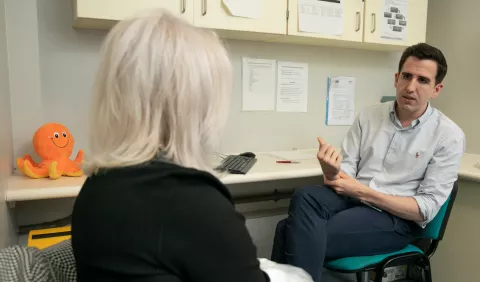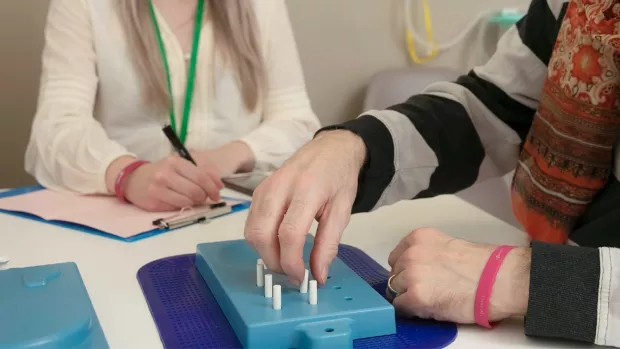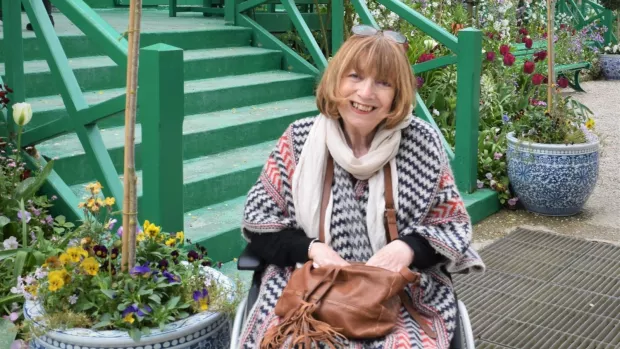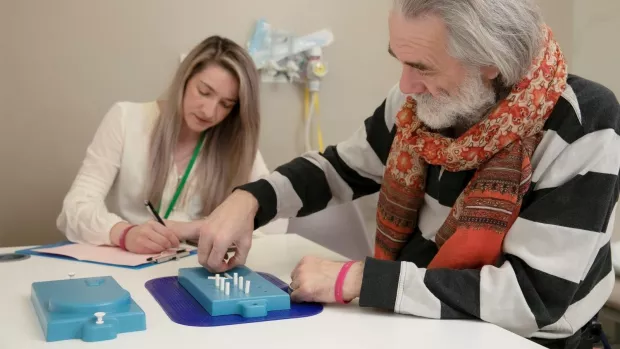
Be in a study
Our vision is for a world free from the effects of MS. And MS research will get us there. But research wouldn’t happen without the people who take part.
There are lots of reasons people take part in MS research. It might be to help make a difference for people in the future. To find a community of like-minded people with MS. To spend more time with MS healthcare professionals. Or to have a chance of testing a new therapy.
Our #BehindTheTrials blog series takes you into the world of our research. With interviews talking to researchers and participants, you'll hear from both sides of the trial experience.
In our blog, What is it like taking part in MS research? We speak with participants from different research projects.
What kind of study could I be in?
Clinical trials test whether potential treatments are safe and effective. Some test new drugs or drugs already used in other conditions.
But you don’t have to be willing to take a drug to be in a trial. Clinical trials can also test non-drug therapies, like psychological therapy or exercise programmes.
And there are observational studies, which just ask you to share information about yourself and your MS. This might involve filling in a questionnaire or providing a saliva sample.
Whatever type of study you take part in, you can help make a difference.
How can I find a study to join?
We know it can be hard to find a study to take part in.
Your GP, MS nurse or neurologist might be able to suggest studies that are right for you.
The National Institute for Health and Care Research (NIHR) has a website listing UK studies for different health conditions. You can search for ‘Multiple Sclerosis’ to find relevant studies.
The US Government Clinical Trials website also provides a database of research studies from around the world. You can search for ‘Multiple Sclerosis’ and ‘United Kingdom’ to find relevant studies.
Currently recruiting studies
Here are some of the major studies we know are enrolling people with MS in the UK now. We have only reviewed the quality of those studies we fund.
We don’t run studies ourselves, so please get in touch with the trial teams with any questions.
If you’re a researcher interested in advertising a UK study, we recommend you get in touch with the Be Part of Research team. Unfortunately, we’re not able to accept unsolicited requests.
Drug trials
We've aimed to provide brief summaries of some of the clinical trials currently taking place in NHS-affiliated organisations. All the trials included have more than one trial site.
These include commercial studies (sponsored by pharmaceutical companies) and non-commercial studies (funded by charities and other not-for-profit organisations). The MS Society only supports non-commerical studies.
Primary and, or secondary progressive MS
Octopus
Octopus is currently testing whether two repurposed drugs, metformin and alpha lipoic acid, can slow MS progression.
Who can take part?
Octopus is recruiting people with primary and secondary progressive MS. People taking part need to have an EDSS between 4.0 and 8.0, and be aged between 25 and 70 years old.
ChariotMS
ChariotMS is testing whether the existing disease modifying therapy (DMT) cladribine can help people with MS maintain the use of their arms and hands.
Who can take part?
ChariotMS is recruiting people with advanced MS. This is most often people with primary or secondary progressive MS, but people with relapsing MS are not excluded.
People taking part need to have an EDSS between 6.5 and 8.5. ChariotMS has no upper age limit.
Commercial trials
O’HAND
O-HAND is testing whether the existing DMT ocrelizumab (Ocrevus) can help people with primary progressive MS retain the use of their arms and hands. Ocrelizumab is already licensed for early, active primary progressive MS.
Who can take part?
O-HAND is recruiting people with primary progressive MS who have an EDSS score between 3.0 and 8.0. People taking part need to be aged between 18 and 65 years.
Read more about the trial on the company website
FENtrepid
FENtrepid is comparing a new drug called fenebrutinib with existing DMT ocrelizumab (Ocrevus) in primary progressive MS. Fenebrutinib is a BTK inhibitor, which is a new type of drug being explored for different types of MS.
Who can take part?
The trial is recruiting people with a diagnosis of primary progressive MS, who score between 3.0 and 6.5 on the EDSS. The age range is 18 to 65 years.
Read more about the trial on the company’s website
PERSEUS
Tolebrutinib is another BTK inhibitor. The PERSEUS trial is comparing tolebrutinib with a placebo (dummy drug) in primary progressive MS.
Who can take part?
The trial is recruiting people with a diagnosis of primary progressive MS, who score between 2.0 and 6.5 on the EDSS. The age range is 18 to 55 years.
Find a list of UK sites on PERSEUS page on the ClinicalTrials.gov website
Relapsing remitting MS
AttackMS
AttackMS is testing whether existing DMT natalizumab (Tysabri) could improve myelin repair, if someone is given it as soon as they have the first signs of MS.
Who can take part?
People can be referred to AttackMS by a healthcare professional, within 14 days of being seen at A and E with their first suspected signs of MS (both symptoms and on an MRI scan). You can live anywhere in the UK, but the sites are all in London.
Find out more by emailing the trial team at:[email protected]
Read a blog from the lead investigator
DELIVER-MS
DELIVER-MS is exploring whether early intensive treatment is the best way to control the accumulation of disability in relapsing MS. One group will start with an intensive treatment. These treatments are more likely to effectively control your MS, but come with the risk of more serious side effects.
Another other group will start off with a milder treatment and only move on to a more intensive treatment if the first one doesn't effectively control their MS.
Who can take part?
The team are recruiting people with relapsing MS who’ve not previously received any DMT. People taking part need to have experienced their first MS symptoms within the last five years. The upper age limit is 55 years.
Find out more on the trial website
StarMS
StarMS is comparing the safety and effectiveness of HSCT with four other DMTs: alemtuzumab (Lemtrada), ocreliuzmab (Ocrevus), cladribine (Mavenclad) and ofatumumab (Kesimpta)
Who can take part?
StarMS is recruiting people with highly active relapsing MS. This means you need to either
- Be taking a DMT and have had a relapse, or an “active" MRI scan in the last 12 months
or
- Have ‘rapidly evolving severe relapsing MS’ and aren’t taking a DMT. This usually means you’ve had two or more disabling relapses in the past year and MRI scans show you have a high level of activity
You also need to be aged between 16 and 55, and have a maximum EDSS score of 6.0.
Find out about StarMS and how to take part on the trial website
Commercial trials
There are over a dozen existing DMTs for relapsing MS. The companies who make these treatments, run lots of trials to find out even more about them. For example, what is their long-term effect? Or how do they affect people in specific groups, like pregnant women?
Some new drugs for relapsing MS are also being explored, including BTK inhibitors.
You can find out about commercial trials for relapsing MS by going to the Be Part of Research or the ClinicalTrials.gov websites.
Other studies
ADAMS
ADAMS is an observational study. It’s exploring whether the genes that we know contribute to MS risk in people with White European ancestry are the same or different for people of non-European ancestry. The study is focusing on people from African and South Asian backgrounds.
Taking part involves giving a saliva sample and filling in a survey.
Who can take part?
You can have any type of MS, but you need to identify as an ancestry other than White British. You also need to be over 18 years old.
REFUEL-MS
REFUEL-MS is a five year project with the goal to develop a new fatigue therapy programme that can be rolled out on the NHS. In the coming years, they’ll be testing their programme in a trial. But right now, they’re still in the design stages. So they’re recruiting people to join focus groups to help them make sure the programme will work for everyone.
Who can take part?
The team are looking for people with MS who are over 18 years old, live in the UK and experience fatigue. You can have any type of MS.
They also want to hear from people who either work as a paid carer for someone with MS or provide unpaid support to someone living with MS.
UK MS Register
UK MS Register is a registry study, which means they collect information from people with MS about life with MS over many years. And researchers use the data to answer questions about MS.
Taking part involves filling in questionnaires. You can also give permission to have your questionnaires linked to your clinical data (such as neurologists’ letters).
Who can take part?
Anyone over the age of 18 living in the UK, who has confirmed diagnosis of MS can take part. You can have any type of MS.
UK MS Pregnancy Register
This is a special part of the UK MS Register that’s trying to understand what it’s like to be pregnant with MS. The study is asking people with MS who are pregnant to fill in a series of questionnaires during their pregnancy. You’ll also be followed up after the birth of your child and again when they are four or give year old.
Who can take part?
Anyone living with MS in the UK who is pregnant can take part. You’ll need online access to fill in the survey, which is hosted by the UK MS Register
Other ways to get involved in MS research
You don't need to take part in a study to shape the future of MS research
Our Tissue Bank allows people to donate their brain and spinal cord tissue for MS research after their death. People with any type of MS can register to donate their tissue. And people without MS can too.
Our Research Network is a group of people affected by MS who help shape our research programme. They make sure all the research we fund reflects the needs and interests of people living with MS.
Anyone who lives with MS or cares for someone who does can get involved. It doesn't matter where in the UK you live or how much research experience you have.
Last full review: | Next review:
We also update when we know about important changes.




